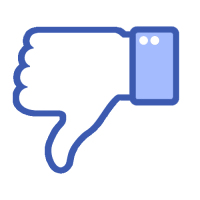(Graphic by Sam Joseph/The Ram)
“Are you okay?” — the first response I got upon telling people I deactivated my Facebook account. Mystery of mysteries: why would someone of our generation make such a choice?
I will admit, my first thought when I heard of someone without a Facebook account was usually, “dirty hipster.” That being said, I would like to state for the record that I am not such a person. Instead, I am an average 21-year-old college student who decided to opt out of the ever-prominent Facebook.
I started seriously thinking of getting rid of it after I watched Annie Hall, one of my favorite movies, two Saturday mornings ago. The movie is set in 1975 and I have always been drawn to the relative simplicity of that time in terms of technology. I wondered what it would be like to exist only in person and not a series of images, words compiled on the Internet.
Today, we spend so much of our lives staring at screens. It is frustrating because in many ways it is unavoidable. Our classes and jobs require us to use the Internet and computers. Social interaction is almost totally mediated. Everyone has a cell phone. Facebook has taken over social relationships. We are presented with the absolute best and brightest moments of our friends’ lives as captured by a camera and series of carefully-created posts. We inevitably, albeit subconsciously, examine each other’s lives, comparing ourselves to others. We often fail to realize we are doing it.
I have often thought about the dichotomy between photographs of myself and who I feel myself to be. Even when looking in the mirror, it is hard to grasp that the image before us is who we are.
We never can truly know how we look. We have only a set of images and videos. But, is that us?
I do not think I am my reflection, or my photograph, or a series of posts and phrases on the Internet. The essential quality of my being can only be found by being in my presence. This is the reason why I had such a problem with my Facebook account boldly labeled with my name. It was as though it was claiming my identity on my behalf. I stared at the Facebook page called Grace Lilly and thought, “That is not me. This is a creation, a synthetic replication of who I am.” I am not my Facebook account.
The power of Facebook is insidious and it creeps up on you. When you need a break from work, check Facebook. When you are bored, check Facebook. The fascinating thing is that its nature is different from any other form of media. Facebook is not really a method of communication. Yes, you can use it to communicate, but that is not what it is at its core. It is a place to watch others.
Many people — myself included for a while — justify having Facebook by using it to stay in others’ lives. Eventually, I came to the personal decision that these people whose lives I was “keeping up on” were not the people who mattered most to me.
I admit I enjoy being able to see what people are up to, but in the end I decided the people who are the most important to me, I know I will stay in touch with. If they matter enough and I value them enough, then I will reach out and communicate with them. But, if I do not even care enough to do that, they clearly are not intrinsic in my life.
It suddenly hit me that I did not want to be a part of it anymore, and that I could choose to leave. In many ways it seems like one must have a Facebook account to function as a member of our generation.
The moment I realized I still had control, I felt incandescently empowered. I want people to know me for who I am face-to-face, so I got rid of my Facebook account.
And, just for the record: yes, I am doing more than okay.
Grace Lilly, FCRH ‘15, is a biology major from Denver.





